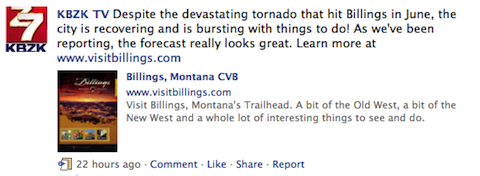I was reading the competition’s page on Facebook the other day, as I often do, when I noticed this posting on KBZK’s wall.

It struck me as odd because KBZK is a Bozeman station. Why would it post about the Billings chamber? Plus, it was not the first time I had seen a post advertising Billings tourism.
(I know the answer is obvious, but bear with me.)
So I made a comment:

The response was simple.
![]()
Selling advertisements or sponsored posts inside a Facebook stream is not a new idea. Companies have done it ever since Facebook became a major platform where lots of people spend lots of time. And, yes, the Chronicle has debated whether to do this.
We opted not to put ads onto our Facebook wall. We did not want to, as I put it at the time, “taint the news stream.” I reasoned that we had earned all our fans on Facebook by providing news. Suddenly inserting ads would anger some followers and cost us the trust we’d earned.
That danger to trust is clear in the post on KBZK’s wall. The problem is that there’s nothing clearly marking it as an advertisement, so a reader might be confused and think that it was news, especially when you read the “as we’ve been reporting” part of the advertisement.
A big part of news ethics is keeping money issues out of it. The advertising side of the business doesn’t have a say in the news content. That way, the readers can trust that the news coverage hasn’t been massaged or shaped to please advertisers.
Is the separation perfect? Of course not. News organizations are still businesses after all, but we try to keep the border between the newsroom and advertising closed as well as we can.
The commenter who responded to KBZK’s answer on Facebook illustrated just the kind of reaction the Chronicle didn’t want to see beneath proposed ads on our Facebook page:
Yep, I’m a fan of KBZK for NEWS, not advertisements. If they continue, the value if diminished, and I will probably just unlike KBZK.
Sure, the Chronicle might be missing out on an opportunity to make money on Facebook, and in a time when the news business is struggling just to keep people on staff, that’s a hard choice to make. But our reputation and relationship with our news readers was deemed more important than money in this case.
It’s true that there are some advertisements out there that people really do want to see on Facebook, such as Groupon-type offers and special discounts for fans. And if the advertising side of the building wants to create its own page on Facebook and build its own fan base, I wish them good luck.
Perhaps the ethical quandaries faced by broadcasters are different. Never having worked TV news, I don’t know. In the meantime, the Chronicle will keep it to just the news on Facebook.